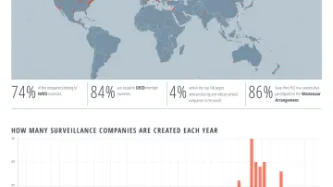Search
Content type: News & Analysis
The first half of 2018 saw two major privacy moments: in March, the Facebook/ Cambridge Analytica scandal broke, followed in May by the EU General Data Protection Regulation ("GDPR") taking effect. The Cambridge Analytica scandal, as it has become known, grabbed the attention and outrage of the media, the public, parliamentarians and regulators around the world - demonstrating that yes, people do care about violations of their privacy and abuse of power. This scandal has been one of…
Content type: Long Read
During the last World Economic Forum in Davos, the CEO of Microsoft joined the chorus of voices calling for new global privacy rules, saying the following in regard to the new European General Data Protection Regulation (GDPR):
“My own point of view is that it's a fantastic start in treating privacy as a human right. I hope that in the United States we do something similar, and that the world converges on a common standard."
We have come a long way. From tech companies fighting and…
Content type: News & Analysis
Our team wanted to see how data companies that are not used to being in the public spotlight would respond to people exercising their data rights. You have the right under the EU General Data Protection Regulation ("GDPR") to demand that companies operating in the European Union (either because they are based here or target their products or services to individuals in the EU) delete your data within one month. We wrote to seven companies and requested that they delete our data, and we've made…
Content type: Advocacy
Today, Privacy International has filed complaints against seven data brokers (Acxiom, Oracle), ad-tech companies (Criteo, Quantcast, Tapad), and credit referencing agencies (Equifax, Experian) with data protection authorities in France, Ireland, and the UK.
It’s been more than five months since the EU’s General Data Protection Regulation (GDPR) came into effect. Fundamentally, the GDPR strengthens rights of individuals with regard to the protection of their data, imposes more…
Content type: Long Read
Privacy International (PI) has today released a new report, 'Teach 'em to Phish: State Sponsors of Surveillance', showing how countries with powerful security agencies are training, equipping, and directly financing foreign surveillance agencies.
Spurred by advances in technology, increased surveillance is both powered by and empowering rising authoritarianism globally, as well as attacks on democracy, rights, and the rule of law.
As well as providing a background to the issue, the report…
Content type: Press release
Privacy International has today released a report that looks at how powerful governments are financing, training and equipping countries — including authoritarian regimes — with surveillance capabilities. The report warns that rather than increasing security, this is entrenching authoritarianism.Countries with powerful security agencies are spending literally billions to equip, finance, and train security and surveillance agencies around the world — including authoritarian regimes. This is…
Content type: Press release
Privacy International, in partnership with 30+ national human rights organisations, has today written to national intelligence oversight bodies in over 40 countries seeking information on the intelligence sharing activities of their governments.
Countries may use secret intelligence sharing arrangements to circumvent international and domestic rules on direct surveillance. These arrangements can also lead to the exchange of information that can facilitate human rights abuses,…
Content type: News & Analysis
Privacy International is today proud to release the Surveillance Industry Index (SII), the world's largest publicly available educational resource of data and documents of its kind on the surveillance industry, and an accompanying report charting the growth of the industry and its current reach.
The SII, which is based on data collected by journalists, activists, and researchers across the world is the product of months of collaboration between Transparency Toolkit and Privacy…
Content type: News & Analysis
We already know that in some countries, like the UK, governments are drafting laws to legalise and legitimise their incredible surveillance powers. In the U.S. we are seeing legislation that is using remarkably similar language on encryption and surveillance. The next phase of the cryptowars has openly begun.
Yesterday what is being called the Feinstein-Burr decryption Bill was introduced into the US Senate and leaked online. Whilst the short title ‘Compliance with Court Orders…
Content type: Press release
Governments must accept they have lost the debate over the legitimacy of mass surveillance and reform their oversight of intelligence gathering, Privacy International and Amnesty International said today in a briefing published two years after Edward Snowden blew the lid on US and UK intelligence agencies’ international spying network.
“The balance of power is beginning to shift,” said Edward Snowden in an article published today in newspapers around the world. “With each court victory,…
Content type: News & Analysis
With the launch of the "Eyes Wide Open" project, Privacy International has put together a fact sheet about the secretive Five Eyes alliance. Consider this a guide to the secret surveillance alliance that has infiltrated every aspect of the modern global communications system.
Beginning in 1946, an alliance of five English-speaking countries (the US, the UK, Australia, Canada and New Zealand) developed a series of bilateral agreements over more than a decade that became known as the UKUSA…
Content type: News & Analysis
Trade has often been a positive driver in encouraging countries to adopt data protection laws, to ensure compliance and ability to conduct business with the European Union and other privacy-respecting partners. However, when free trade agreements are negotiated in secret and influenced by powerful business interests, the result is a severe watering down of existing privacy protections.
There is a high risk of this happening in the free trade negotiations between the European Union…
Content type: Press release
Google's latest Transparency Report, released at 3pm GMT this afternoon, shows that requests by European governments for the browsing history, email communications, documents and IP addresses of Google's users have skyrocketed since the Transparency Report was launched three years ago. Countries in the European Union made 7,254 requests about 9,240 users or accounts between July and December 2012, averaging over 1,200 requests a month. This represents over a third of all requests made by…
Content type: News & Analysis
Privacy International and the American Civil Liberties Union have appealed to the Council of the European Union, the European Commission, the European Parliament, and privacy commissioners in 31 countries across Europe to repeal the agreement between the EU and the US on passenger data transfers. We argue that, with the recent disclosure of the 'Automated Targeting System' being used by the US Department of Homeland Security, the US has violated both American law and the agreement with the EU…








